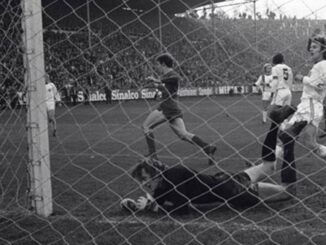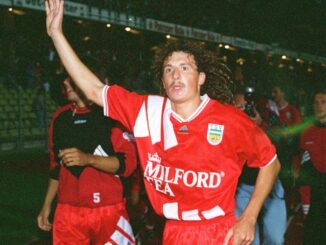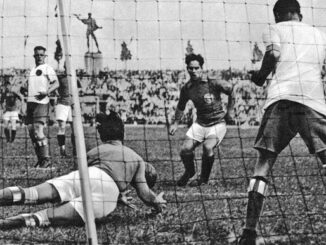
1FC Magdeburg 2-0 Milan (European Cup Winners’ Cup final)- Feyenoord Stadion, Rotterdam, 8 May 1974
David v Goliath, East v West, Communism v Capitalism, or la Dolce Vita v the Socialist Way- pick your own comparison, but the 1974 Cup Winners’ Cup final was a unique moment in European football where the side from behind the Iron Curtain put East German football firmly on the map and not only won a victory for the DDR in footballing terms but also in terms of their ideological war against the supposedly superior West.
A foregone conclusion?
Such was the theoretical mismatch ahead of the final, that only a mere 4,641 fans bothered to turn up at the de Kuip stadium. Strict travel restrictions meant that only 350 specially selected East Germans were permitted to attend and the majority of those were East German merchant seamen, who were docked in the Dutch port city and not actual Magdeburg supporters.
The final wasn’t even going to be transmitted in the German Democratic Republic on television until a last-minute change in the schedules. Having the stadium’s ‘capitalist’ advertising hoardings spreading the exotic brands of Coca-Cola, Marlboro, Sony, and Stella Artois into East German homes was seen as anathema to the Communist party leaders.

Milan weren’t just favourites, they were seen as overwhelming favourites to just turn up and claim the trophy. The reigning holders had beaten Leeds United in the previous year’s final and arrived as nine-time Serie A champions, three-time Coppa Italia winners, as well as having won two European Cups, two Cup Winners’ Cups, and one Intercontinental Cup. Their side included such illustrious names as Franco Bergamaschi, the German Karl-Heinz Schnellinger and Gianni Rivera. As for Magdeburg, nearly their players worked at the Ernst Thälmann Heavy Machinery Combine.
The Italians had knocked out Borussia Mönchengladbach in the semi-finals to prevent an all-German final. The long-awaited clash between the GDR and the FRG would have to wait until the World Cup held later that summer.
Un brusco risveglio (a rude awakening)
The Italians as expected started well and looked very much like a polished machine that was going to stroll to victory and they had their chances in the first half to score. Magdeburg however stood firm and kept the Rossoneri at bay. The GDR side’s speed and general fitness seemed to take Milan by surprise and when the first goal did arrive on 42 minutes, it was even more surprisingly the unfancied East Germans who scored it.
Detlev Raugust sped away down the flank, before crossing towards Jürgen Sparwasser. The ball however was sent skidding into his own net by defender Enrico Lanzi. It was a setback, but one which Milan were fully expected to overcome in the second half, but rather than being stung into action, they continued to struggle against the efforts of their supposedly inferior opponents. The experience (and age) of veterans Rivera and Schnellinger was no match for the younger Magdeburg side, whose average age was just 22.3 years.

Sixteen minutes from time, Magdeburg secured the trophy when Axel Tyll sent over a crossfield ball and from a tight angle, Wolfgang Seguin fired past Milan keeper Pierluigi Pizzaballa.
The atmosphere at the final whistle was a strange one with Milan fans taking to burning their flags in a sign of their dissatisfaction and the Magdeburg players setting off on a lap of honour dressed in white cotton bathrobes (GDR-made bath robes of course!)-supposedly to combat the cold.
A telegram from SED party chief Erich Honecker was waiting for them in the changing rooms. ‘Dear sports fans! I warmly congratulate you on this outstanding achievement and wish you continued success!’ was his rather succinct message. The champagne was cracked open (East German Rotkäppchen of course) and the team returned back behind the Iron Curtain as conquerors of the great Milan and heroes of the German Democratic Republic.

Coach Heinz Krügel’s achievements soon brought attention from overseas with one report claiming that Juventus were keen on taking him and striker Martin Hoffman to Turin. This was never going to be allowed by the East German state and the legendary coach soon found himself out of favour and demoted to a menial role at a minor club. He was said to have failed to develop East German athletes, but an incident where he refused to use bugged recordings from inside Bayern Munich’s dressing room ahead of a match saw suspicions raised as to his closeness to the West.
No other East German club side ever managed to achieve what Magdeburg did and their victory over Milan remains one of the biggest upsets seen in a European final.
1FC Magdeburg: Schulze, Zapf, Tyll, Abraham, Enge, Pommerenke, Gaube, Seguin, Raugust, Sparwasser, Hofmann
Trainer: Heinz Krügel
Goals: Lanzi. (og) 42, Seguin, 74
Milan: Pizzaballa, Schnellinger, Anquiletti, Lanzi, Sabadini, Maldera, Benetti, Rivera, Bergamaschi (Turini 60), Tresoldi, Bignon
Trainer: Giovanni Trapattoni
This article is part of a new series on Bundesliga Fanatic entitled German Football’s Greatest Games. Celebrating 120 years since the first ever German football championship and 60 years since the first Bundesliga season, we’ll be going back through the country’s footballing history and writing about some of the most important and most memorable games Germany has ever seen.
Click the tag ‘German Football’s Greatest Games’ to see all the entries in the series.



